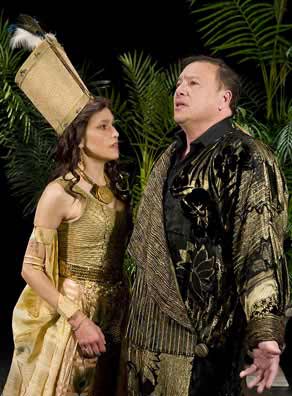A New Translation of The Persians Reinvents the Chorus
A Modern Ancient Tragedy

Modern versions of ancient Greek tragedy face many obstacles on their way to potential aesthetic success. When DIJO Productions and Virtual Theatre Company open a new version of the world’s oldest play tonight at Victoria Hall, they will be up against perhaps the toughest of all of them: what to do with the chorus? The Persians recounts the events surrounding the Greeks’ great victory at Salamis from the point of view of their enemies, the Persians, and it contains some of the greatest-and most substantial-choral writing in the entire corpus of Greek tragedy. Coming, as it does, first in time of all extant dramatic works, The Persians is also closer to the ritual roots of theater than any other play. The role of the chorus is close to what it once was in the Eleusinian mysteries of which its author, Aeschylus, was an adept.
In early ancient Greek drama, all members of the audience were considered part of the satyr chorus, an ecstatic communal body that rushed down from celebrating the rites of Dionysus in the neighboring hillside directly into the theater, where they joined with the actors in a state of mutual transcendence. Today, long recitations by massed groups of voices are unlikely to have a similar effect. At the prompting of playwright Ellen McLaughlin’s friend Tony Randall, who felt that The Persians‘ message of warning to arrogant empires had a contemporary significance at the beginning of the war in Iraq, McLaughlin took on the task of translating this ancient play for the modern theater. The result is a script that thoroughly re-imagines the choral parts, allowing for individual voices to emerge from, and character development to take place within, the massed group of 13 men who will take the stage to play this collective role at Victoria Hall.
For director Ed Giron, this has been just one of the pleasures in tackling what he terms “the ultimate historical play.” Giron and his producing and acting associate Jerry Oshinsky have, over the last year and a half, cultivated an audience for plays dealing with historical subjects, including everything from the birth of abstract expressionist painting to the development of the atomic bomb. While The Persians may seem a shift from this strategy, Giron and Oshinsky see it as a logical extension. To understand why, one only need look at their cleverly worded synopsis, which describes the play as the story of “an unfinished war : begun by the father and continued with disastrous consequences by the son.” The father and son leaders in this case are not named Bush, but rather Darius and his son Xerxes, the leaders of the ancient Persians in their struggle with Greece.
The play examines the reaction of Queen Atossa (Deborah Helm) to the return of her defeated son Xerxes (Alfred St. John Smith) and their mutual interaction with two other figures-the ghost of her husband and his father, Darius (Ed Giron), and a herald (Ed Lee). In McLaughlin’s new translation, the members of the chorus are understood to be cabinet and war ministers of Persia.
The Persians stands out among the ancient Greek tragedies for a number of reasons-it’s the only one based on history rather than myth, for one-but none has been more controversial than the fact that it portrays the inner workings of the enemies’ high command. Aristotle contended that tragedies preach pity and fear for their subjects; in other words, a fundamentally sympathetic attitude. But to many critics, The Persians is the exception to the rule, and instead was intended to celebrate the crushing defeat of the Greeks’ greatest foe. This great critical question about The Persians-is it sympathetic to its subject or not?-will get an interesting answer from the current production because, to at least some of the people involved, it hasn’t yet been fully answered. “At first I thought the play was unsympathetic to the Persians,” Oshinsky said, “but as we became immersed in rehearsals, I became more convinced that there is room for sympathy and pathos on both sides.”
For Giron, the play is “sympathetic to the people of Persia,” but the real focus is on “the way great cultures sometimes destroy themselves.” He calls the play’s political message a “warning,” but he also claims that there is no implicit political side-taking involved. When asked if the show is anti-Bush, he said, “I doubt that Aeschylus had that in mind.” For him, the show represents an opportunity to take the work of his ensemble further and to create from a particularly stimulating score. Having met with both translator Ellen McLaughlin and composer of the new original score Michael Roth during the development process, Giron is clearly taking in everything available to inform his vision of the play. The object is to entertain and to provoke discussion, something Giron certainly does in asking, “Is our current political leadership an aberration or a reflection of some new and disturbing set of ‘American values’?”
4•1•1
The Persians previews tonight, Thursday, March 27, and opens officially on Friday, March 28. It will continue at Victoria Hall with performances on March 29 and 30 at 8 p.m. Additional performances are on April 3, 4, 5, 10, 11, and 12 at 8 p.m.; April 6 at 2 p.m.; and April 9 at noon (includes lunch). For tickets and information, call 494-8497 or visit boxofficetickets.com/victoriahalltheater.



